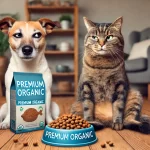Introduction
Grain-free organic pet food is growing in popularity, especially among pet owners looking to support their pet’s digestive health with natural ingredients. This article will explore the benefits of grain-free formulas, provide top recommendations for high-quality grain-free organic pet food, and offer guidance on selecting the right food to meet your pet’s unique nutritional needs.
What is Grain-Free Organic Pet Food?

Grain-free organic pet food is made without grains such as wheat, corn, and soy and is crafted with organically certified ingredients. This type of food is particularly beneficial for pets with grain sensitivities or allergies, helping to reduce digestive discomfort and improve nutrient absorption.
- Grain-Free Definition: Grain-free foods omit common grains that can be hard for some pets to digest, substituting them with nutrient-dense ingredients like sweet potatoes, peas, and lentils.
- Organic Standards: Certified organic pet food must be free from synthetic pesticides, GMOs, and artificial additives, ensuring a pure, high-quality product.
- Who Benefits?: Pets with food allergies, sensitive stomachs, or skin issues may particularly benefit from grain-free organic options.
Benefits of Grain-Free Pet Food for Digestive Health
Grain-free formulas offer numerous digestive benefits, particularly for pets with sensitivities:
- Reduced Allergens: By omitting grains, grain-free foods can minimize allergens, which is particularly beneficial for pets with sensitivities or allergies.
- Easier Digestion: Grain-free formulas are often easier to digest, using ingredients that are gentler on the stomach, such as sweet potatoes or peas.
- Enhanced Nutrient Absorption: High-quality organic ingredients aid in nutrient absorption, ensuring pets receive essential vitamins and minerals without fillers.
- Improved Energy Levels: Pets with a more balanced diet often experience improved energy levels, as their digestive system can operate more efficiently.
These advantages make grain-free organic pet food a great option for supporting your pet’s digestive health and overall well-being.
Recommended Grain-Free Organic Pet Foods for Various Ages and Sizes
| Brand | Best For | Benefits |
|---|---|---|
| Castor & Pollux Organix | All Ages & Breeds | USDA-certified organic, high-quality protein sources |
| The Honest Kitchen | Puppies and Small Dogs | Human-grade ingredients, easily digestible grain-free formula |
| Tender & True | Adult Dogs with Sensitive Stomachs | Limited ingredient formula, no artificial additives |
| Acana Singles | Senior Pets | Contains single-source protein, organic fruits and veggies |
| Blue Buffalo Wilderness | Active Breeds | Grain-free, rich in Omega fatty acids, no artificial colors |
These brands have been chosen for their commitment to quality, natural ingredients, and supportive formulations for pets with sensitive digestive systems.
Nutritional Comparison: Grain-Free vs. Grain-Inclusive Pet Foods
Here’s a breakdown comparing the nutritional differences between grain-free and grain-inclusive pet foods:
| Nutrient | Grain-Free Organic | Grain-Inclusive Organic |
|---|---|---|
| Primary Carbohydrate | Sweet potatoes, peas, lentils | Brown rice, oats, barley |
| Fiber Source | Vegetables, legumes | Grains, vegetables |
| Digestibility | Easier to digest for sensitive pets | Generally digestible, may cause sensitivities |
| Suitability | Pets with sensitivities, active pets | Pets without allergies, general maintenance |
| Price | Often higher due to specialized ingredients | Typically lower, more readily available |
This table highlights how grain-free and grain-inclusive options can both support different nutritional needs. While grain-free food may be gentler on the digestive system, grain-inclusive formulas may provide adequate nutrition for pets without sensitivities.
Tips for Choosing the Right Grain-Free Organic Food
Choosing the best grain-free organic pet food requires a few considerations:
- Look for Single-Source Proteins: Single-source proteins (like chicken or beef) reduce the risk of allergic reactions and simplify the ingredient list.
- Avoid Artificial Additives: Ensure the food is free from artificial preservatives, colors, and flavors, which can trigger allergies and digestive issues.
- Focus on Nutrient-Dense Carbohydrates: Sweet potatoes and peas are excellent grain substitutes that provide fiber and energy without irritating the stomach.
- Verify Certifications: Look for USDA Organic or similar certifications to ensure the food meets strict organic standards.
These tips can help you identify high-quality grain-free organic foods that will support your pet’s unique dietary needs.
Frequently Asked Questions About Grain-Free Organic Pet Food
1. Is grain-free pet food better for all pets?
- Not necessarily. Grain-free food is particularly beneficial for pets with grain allergies or sensitivities. Pets without sensitivities may do well with either grain-free or grain-inclusive diets.
2. Why is organic grain-free food more expensive?
- Organic and grain-free ingredients are often more expensive due to sustainable farming practices and higher-quality sourcing, reflecting in the cost of the final product.
3. Can I switch my pet to grain-free food directly?
- It’s recommended to transition gradually, mixing the new food with the current food over a period of 7-10 days to prevent digestive upset.
Recommended Brands and External Resources
For further information on grain-free organic pet food, here are some trusted brands and sources:
- Castor & Pollux Organix: A leader in organic pet food, offering grain-free options with USDA certification.
- The Honest Kitchen: Known for their dehydrated, human-grade organic pet food, The Honest Kitchen offers gentle, nutritious options for sensitive pets.
- PetMD: Understanding Grain-Free Diets: An article that covers the benefits and considerations of grain-free diets for pets.
- American Kennel Club: Grain-Free vs. Grain-Inclusive: AKC’s insights on choosing between grain-free and grain-inclusive options.
Conclusion
Choosing a grain-free organic pet food can significantly improve your pet’s digestive health, especially if they suffer from allergies or sensitivities. By understanding the benefits of grain-free formulas, knowing what to look for in a high-quality product, and making an informed choice, you can provide your pet with the best possible diet. Always consult your veterinarian if you’re unsure about making dietary changes, and select trusted, certified brands to ensure your pet gets the premium nutrition they deserve.


